- Home
- Gerald Hammond
Dead Weight (Three Oaks Book 11) Page 5
Dead Weight (Three Oaks Book 11) Read online
Page 5
I led the way to the chairs under the birch. In hot weather we keep a bucket of fresh water there for the refreshment of visiting dogs and before taking a seat the man waited for the Airedale to drink before it collapsed onto its side, panting with the heat.
‘This is Blitzen. Poor old chap,’ Bovis said fondly. ‘He’s twelve, you know. We’ve had some good years together. I don’t suppose he’ll have many more, but he comes with me everywhere while he still can. I thought he’d enjoy the walk from the village but he does feel this heat. So do I.’ He fanned himself with a copy of the Fife Herald that Beth had left on the table. ‘Is your cat safely out of the way?’
‘He was sleeping on the stairs, last time I saw him.’
‘That should be all right, then.’ Bovis half smiled. ‘Blitzen’s a peaceful old boy. Only cats can rouse him into any semblance of his former energy. He hates them all with an uncompromising hatred. All but one, that is. He gets on all right with my neighbour’s cat, which is even older than he is. A pair of geriatrics together, I suppose. But when he isn’t in the car with me he spends his days in a secure garden, sleeping away the hours, well away from cats. It’s sad when they get old.’
There was a short silence. He patted his brow with a large, white handkerchief. ‘You’re not at the shop today then,’ I said to stir him into life.
‘I’m mostly the buyer,’ he said. ‘I work a lot of evenings and weekends, attending auctions and visiting junk shops, so I leave the shop to the others. That, indirectly, is one reason why I came. The other is . . . that!’ He indicated Blitzen, who was making an effort, impeded by the stiffness of age, to scratch his own chest. ‘He seems to have picked up a flea somewhere.’
‘You want Isobel,’ I said. ‘I’ll fetch her in a minute. What was the first reason?’
‘I need a businessman with a shotgun certificate, and you were the nearest one I could think of.’
‘Go on,’ I said warily. This kind of approach sometimes leads towards matters which are close to the far edge of the strictly legal and I was beginning to feel that his air of openness and honesty was a little too cultivated to be true. The army is a great educator when it comes to spotting frauds and line-shooters and I was not going to put my shotgun certificate at risk for anybody.
‘On Saturday, there was a sale in Kirkcaldy – the contents of a big house near Anstruther. There was some good stuff there. To cut a long story short, there was a hammer-gun in the sale. Well, these days guns and shooting are becoming dirty words in the towns. There was a reserve price of two hundred on it and nobody else was bidding, so that’s what I paid for it. But when I went to collect my purchase they wouldn’t let me have it without a shotgun certificate. They said that it was the law.’
‘It is,’ I told him.
‘Well, it’s a damned nuisance. I wondered if you’d pick it up for me and we’ll split any profit we can make on it.’
At that moment Audrey passed by, leading two pups. I asked her to invite Isobel to join us. ‘If the gun’s clapped out and out of proof,’ I told Bovis, ‘you probably paid too much. You’d have to have it deactivated by a Proof House, which doesn’t come cheap, and then sell it as a wall hanger. What name’s on it?’
Bovis looked pained although I would have thought that an antique dealer must become hardened to the occasional piece of bad news. ‘I don’t think it’s clapped out,’ he said. ‘It has those barrels with a pattern. What do you call them?’
‘Damascus?’
‘That’s right. They look to be in good order. I’m not an expert but I couldn’t see any dents or scratches. And I know a piece of good figured walnut when I see it. The name Macnaughten was on the rib.’
I pricked up my ears. The Macnaughten action was the direct forbear of my Dickson. ‘I can get that organized for you,’ I said. ‘Henry Kitts goes through to the Borders regularly and he knows one of the top dealers in antique guns. Shall I fix it all up?’
‘Please do.’ He paused and I saw the first traces of guile peeping out of his honest eyes. ‘You needn’t tell him that you’re in for a share of the profit. I won’t tell him if you don’t. Just let me know the figure before accepting it, that’s all I ask.’
I could well imagine him charming an old lady and getting a bargain of a piece of eighteenth-century silver discovered among her electroplate. ‘You’d better phone the auctioneers,’ I said, ‘and tell them to hold it until one of us calls by.’
‘Mr Kitts has a shotgun certificate?’ Bovis asked.
‘Probably the first one ever issued,’ I told him.
Isobel chose that moment to arrive in answer to my message. ‘Henry would sue you for that,’ she told me severely. ‘Good morning,’ she added. ‘I think you’re Roland Bovis.’
‘Correct,’ he said. They shook hands. ‘I’m told that you’re the flea expert around these parts.’
‘That’s not my only talent,’ Isobel said, ‘but it’ll do to be going on with. You’re sure that it’s not mites, or a tick? This old chap, is it?’ She bent down and parted the hair along Blitzen’s back. ‘Hullo, has he come across a myxied rabbit recently?’
‘Oh Lord!’ said Bovis. ‘Don’t say that he’s picked up something even worse than a flea! He had a good look at a dead one on Friday, near Perth. I let him out of the car for a leg-stretch and of course he made a beeline for the foulest object he could find to roll on. Why do you ask?’
‘Nothing terrible. He has a few rabbit fleas,’ Isobel said.
Bovis leaned down and looked where Isobel was looking. ‘You must have marvellous eyesight,’ he said. ‘How do you know they’re rabbit fleas? I can only see tiny specks.’
‘But they’re black specks. Dog and cat fleas are brown. If the rabbit had been dead for some time, its fleas would be desperate to transfer to something living. Don’t worry, they don’t usually stay long, but I’ll give you something to make sure of it.’
‘While you’re messing with your witch’s brews,’ I said, ‘Mrs Horner’s cat is also having a scratch. Her specks looked black to me.’
‘She may have got them from Blitzen,’ Bovis said. ‘They’re good buddies and Blitzen was also the only dog that Mrs Horner would let inside her gate.’
Isobel gave a sigh, taking the importation of parasites as a personal affront. She produced a small bottle from her overall pocket and deposited a few drops between the hairs on Blitzen’s nape. ‘I’ll give you some insecticidal shampoo,’ she said, ‘just to make sure. That was a shock, your neighbour dying like that.’
‘It was sudden,’ Bovis said. ‘And possibly accidental but quite possibly not.’ He gave an ostentatious shudder. ‘It doesn’t bear thinking about.’
‘You were on quite good terms with her, I understand.’
Bovis stiffened. ‘I used to help her out when she needed a man about the place, if that’s what you mean. I quite liked the old thing. At least her malice was usually honest and she never went for anyone who couldn’t answer back. I had no reason to kill her. All the same, I’m not sorry that I was away all day on Saturday.’
‘I didn’t mean that at all,’ Isobel said, distressed. ‘I never suggested such a thing.’
Bovis, at least partially mollified, led his aged canine companion haltingly away but the interruptions were not yet over. I had already collected the dog, my gun and a bag of training accessories when I was hailed by name from the direction of the road.
The newest arrival was a sallow man wearing, despite the heat, a plastic mackintosh and a tweed hat. If he knew my name and also my dislike of being called ‘Captain’, the probabilities were that he knew me and, although it may be true that More know Tom Fool than Tom Fool knows, I had a vague sense of having encountered him in the past. Such feelings of déjà vu only too often turn out to be from having seen the other on television or even on a ‘Wanted’ poster, so it seemed prudent to wait, with eyebrows raised, for his approach.
When the stranger identified himself, I recalled him immediately. His
name was Jeremy Faulds and he was a reporter with one of the Scottish papers. On a previous occasion when violent crime had touched our community, he had given the story thorough coverage; but where he could easily have sensationalized our peripheral role to our embarrassment and possible disadvantage he had instead been fair and factual.
Isobel, recognizing the smell of the Press, had vanished indoors, leaving me to face any inquisition alone. I saw no need to do so while standing in the sun holding about a stone of assorted equipment. I led the man and the dog back to the seats under the silver birch and deposited my load on the table.
‘It’s been a few years,’ he said as he folded down into one of the chairs. ‘And now you’ve lost a good neighbour.’
During these last few seconds, I had totted up the pros and cons of wising up the Press and had decided that limited revelation might be to Alistair’s advantage. I met Faulds’s eye. ‘Not attributable?’ I said.
He shook his head and made a note in a small book which he produced apparently out of thin air. I knew that my name would not be mentioned.
‘If you’ve done your homework,’ I said, ‘you’ll know by now that the lady concerned was universally disliked. She revelled in unpopularity.’
He considered me for a moment. He might be honest, as reporters go, but he was wondering how to get the maximum of information out of me. In the end, he decided on the direct approach. ‘Who, in particular?’
‘When I said “universally”,’ I told him, ‘I meant it.’
He grinned. His teeth were very uneven. If I had seen them at first glance I would have remembered him immediately. ‘I could reply that when I said “Who, in particular?” I meant that. I’ve been getting a similar sort of reaction wherever I’ve been. Nobody wants to mention names.’
‘I’m one of them,’ I said. ‘Ask around but don’t ask me.’
There was a pause. ‘Who is Alistair Branch?’ he asked suddenly.
‘A very placid, retired gentleman who had the misfortune to live in the same road as Mrs Horner. You’ve heard that he had a run-in with her. But so what? You only heard about it at all because we were discussing it in the hotel a few days ago and the story went the rounds. But as far as I’m aware, the police are still investigating and will probably conclude that she died accidentally.’
‘That’s not the hint that I’ve been getting.’
‘I can’t help that,’ I said. My mind had been working on its own parallel track and I thought that I could see a way to steal an advantage. ‘And if they do decide that somebody gave her a helping hand into the water butt,’ I said, ‘at least a dozen others had just as strong a reason to dislike her. I did, to name but one.’
He grinned again. ‘Can I quote you on that?’
‘I think I’m about to give you something and demand a little coverage, but I’d still like my name left out of it. Wait here a moment.’ I gave You the signal to stay and hurried into the house. Bruce, I remembered, had left the two letters from Mrs Horner to the newspapers on the sitting-room mantelpiece and must have forgotten them because they were still there. I carried them into the garden.
‘You knew that she had a bee in her bonnet about dogs?’ I asked Faulds.
‘Yes. But that doesn’t make her unique.’
‘In a way,’ I said, ‘it does. The papers, yours among others, have been carrying letters by the dozen, all complaining about noise and teeth and danger to health and everything else that dogs ever get blamed for.’
‘Well, then—’
‘These were found in her house, ready for the post. Both typed on her typewriter.’ I gave him the letters. ‘These are typical,’ I said. ‘You’ll see that they purport to come from other people but I’m prepared to bet that not even the addresses are real. You’ll also see that one of them – to your paper – pretends to be in support of an earlier letter which she almost certainly wrote herself. You could check that.’
He read both letters several times and pursed his lips. ‘And this gives you a motive?’
‘Dogs are my livelihood. And my life. Anything that hurts them hurts me. Unfortunately, from your point of view, I didn’t know any of this until after she was dead.’
‘It certainly throws a little light on her character,’ he said slowly.
‘And on the letters,’ I said. ‘I expect you to compare these with the originals of the others and to tell your readers that you’ve been fooled by false complaints.’
‘My editor may not go along with that,’ he said.
“Tell him that, if he doesn’t, I’ll suggest to the Press Council that he’s been having his own staff write dummy letters to whip up public feeling against Man’s Best Friend.’
‘You wouldn’t!’
‘I bloody well would,’ I told him. ‘But think for a moment. You now have a newsworthy opportunity to pontificate about the dead woman’s deviousness and spite. It’ll send a ripple through the other papers, but you’ll have had it first.’
*
Bruce’s partners, he told us, saw no objection to his acting for Alistair as well as being Mrs Horner’s executor. He would be spending several working days in the village, inventorying Mrs Horner’s possessions and going through her papers as well as keeping a protective eye on Alistair.
In a way, this suited us rather well. I had no wish to become involved in receiving the real or imaginary evidence produced by our young helpers, especially at Three Oaks and during working hours when I might be expected to pay, albeit modestly, for the time entailed. I appointed Francis to gather and tabulate the information and told him to report direct to Bruce at Old Ford Road. Francis approached this duty with great seriousness, borrowing for the purpose his father’s laptop computer.
With Bruce spending most of each day with Alistair or within a few doors of his house, we might have first heard of the next development only through the grapevine. On that Tuesday, however, Bruce had returned to join us for our evening meal. Isobel, Henry and Daffy had gone to their homes so, counting Sam, we were only five at table. Bruce was too discreet to refer to a client’s affairs unnecessarily. Beth, I could tell, was desperate to ask whether there had been any developments, but she feared a snub if her cousin retreated behind his professional ethics. Thus our mealtime conversation wandered randomly over a vast range of topics, from politics to religion to superstition, to penal reform and so back to politics again. Sam was allowed to join in provided that his remarks were to the point and, in fact, his views were the most strongly held of any although I thought that I could detect some of my own more entrenched arguments among his. He was at the age when a boy is most certain that his own opinions are indisputable. Some never grow beyond it.
We were interrupted as we were finishing our meal with locally grown strawberries and ice cream. We heard the patter of frantic feet running, almost staggering, from the direction of the road and up to the front door. Hannah was first to her feet but before she could get to the front door it had been pushed open and a small figure stumbled through the hall and into the kitchen. With some difficulty, I recognized a lady whom I had sometimes seen around the village.
We all jumped up quickly. Somebody pushed a chair behind her and she was lowered into it. She seemed unhurt but she was shaking as if palsied and she was panting like an overheated dog.
‘Mrs Branch,’ Bruce said, ‘what’s wrong?’
It happened that I had never met Alistair’s wife but she seemed well known to the others. She dabbed at her hair, which was in wild disarray. ‘Wanted you,’ she gasped to Bruce. She snatched several deep breaths. ‘Can’t drive.’ Two more breaths. ‘Ran all the way.’
Beth rounded on Sam, who was listening, goggle-eyed. ‘Go and get ready for bed,’ she told him. ‘Now!’
‘But Mum!’
‘Go! But Betty,’ Beth said, ‘you could have phoned.’
Betty Branch nodded violently and drew several more breaths. She was holding both hands to her chest. Having partially caught up with her o
xygen debt she was ready to speak. ‘I knew Mr Hastie was staying here,’ she said, ‘but I didn’t have the number and stupidly I couldn’t remember your surname. It’s Cunningham, of course. I remember now.’
She struck an immediate chord with me. Since my illness, my memory for names always deserts me in times of crisis. ‘We are in the yellow pages,’ I pointed out.
‘I never thought of that.’ She dabbed again at her hair and pulled at her disarranged blouse before turning back to Bruce. ‘Mr Hastie, they’ve arrested Alistair. That mannie Blosson came back with two other men and they gave Alistair some sort of warning and they took him away and I didn’t know what to do so I came straight to you.’ Her voice broke.
Beth caught my eye and mouthed ‘Brandy’. I had just had the same thought. It is our sovereign specific for all sicknesses and disasters. I hurried through to the sitting room, poured a generous measure and returned.
‘There won’t be much that we can do at this time of night,’ Bruce was saying, ‘except to remind him not to make a statement until I’m with him. If they’ve arrested him, and if he was given a formal caution – it sounds as though they would certainly have done that – they won’t be letting him walk out just yet. Let me run you home and we’ll make up a bag with what he’ll need – pyjamas and so on, nothing expensive – and I’ll take it to him and see what’s going on. Did they say where they’re taking him?’
‘Cupar, I think they said.’
‘That would be likely. Will you be able to manage? Do you have anyone who could stay with you?’
Mrs Branch had been sipping the brandy and seemed to be sitting straighter but now she slumped again. ‘My son’s in Canada,’ she said helplessly. ‘I have a sister in Hereford, but she couldn’t come right away.’

 Home to Roost
Home to Roost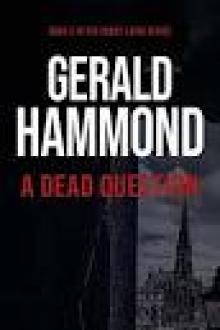 A Dead Question
A Dead Question Twice Bitten
Twice Bitten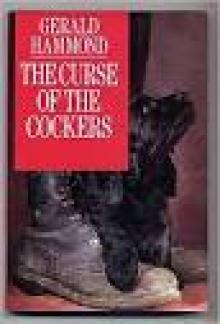 The Curse of the Cockers
The Curse of the Cockers In Loving Memory
In Loving Memory Illegal Tender (Three Oaks Book 12)
Illegal Tender (Three Oaks Book 12) Cold Relations (Honey Laird Book 1)
Cold Relations (Honey Laird Book 1)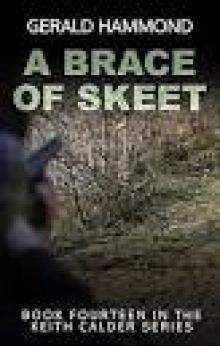 A Brace of Skeet
A Brace of Skeet Silver City Scandal
Silver City Scandal Sauce For the Pigeon
Sauce For the Pigeon Cold Relations
Cold Relations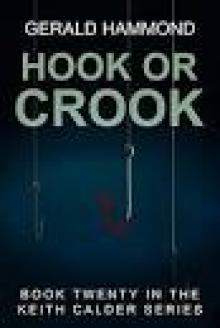 Hook or Crook
Hook or Crook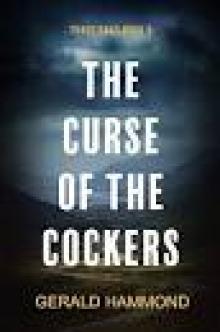 The Curse of the Cockers (Three Oaks Book 5)
The Curse of the Cockers (Three Oaks Book 5) Snatch Crop
Snatch Crop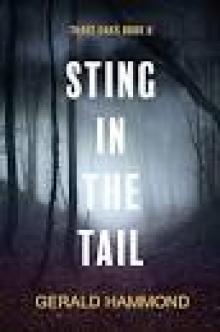 Sting in the Tail (Three Oaks Book 6)
Sting in the Tail (Three Oaks Book 6)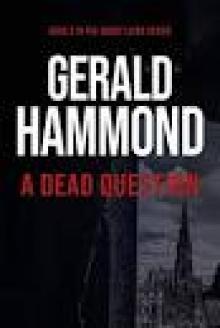 A Dead Question (Honey Laird Book 2)
A Dead Question (Honey Laird Book 2)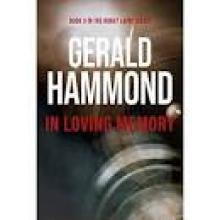 In Loving Memory (Honey Laird Book 3)
In Loving Memory (Honey Laird Book 3) Thin Air
Thin Air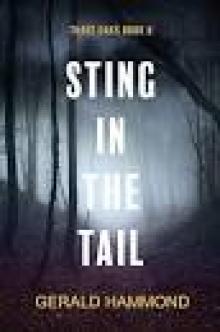 Sting in the Tail
Sting in the Tail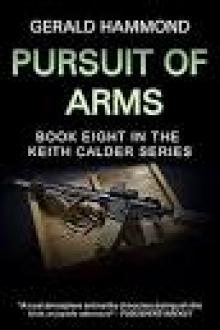 Pursuit of Arms
Pursuit of Arms The Game
The Game Give a Dog a Name (Three Oaks Book 4)
Give a Dog a Name (Three Oaks Book 4) Fair Game
Fair Game The Executor (Keith Calder Book 10)
The Executor (Keith Calder Book 10) Whose Dog Are You? (Three Oaks Book 2)
Whose Dog Are You? (Three Oaks Book 2) Mad Dogs and Scotsmen (Three Oaks Book 7)
Mad Dogs and Scotsmen (Three Oaks Book 7) Cousin Once Removed
Cousin Once Removed The Worried Widow
The Worried Widow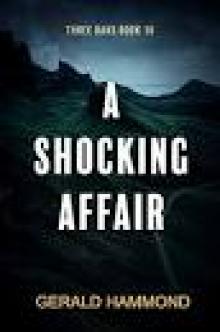 A Shocking Affair
A Shocking Affair Dead Weight (Three Oaks Book 11)
Dead Weight (Three Oaks Book 11) Whose Dog Are You
Whose Dog Are You The Revenge Game
The Revenge Game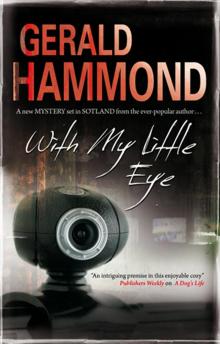 With My Little Eye
With My Little Eye Doghouse (Three Oaks Book 3)
Doghouse (Three Oaks Book 3)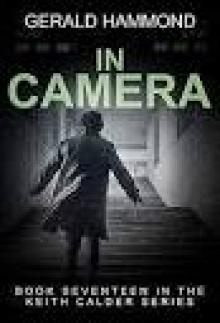 In Camera
In Camera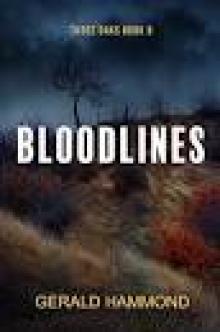 Bloodlines (Three Oaks Book 8)
Bloodlines (Three Oaks Book 8)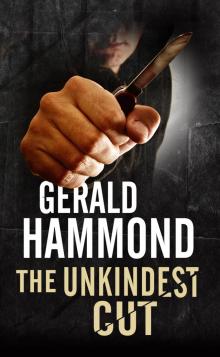 The Unkindest Cut
The Unkindest Cut